| Pages:
1
..
10
11
12
13
14
15 |
Rainwater
National Hazard
   
Posts: 946
Registered: 22-12-2021
Member Is Offline
Mood: Break'n glass & kick'n a's
|
|
Friends insisted that we make some fire for new years so before the celebration began i showed them what a 10 monutes of nitration will do to a 3
grams of cotton. Shot @ 800fps.
Attachment: 20211231_183012_1_1.mp4 (3.8MB)
This file has been downloaded 482 times
"You can't do that" - challenge accepted
|
|
|
j_sum1
Administrator
       
Posts: 6338
Registered: 4-10-2014
Location: At home
Member Is Offline
Mood: Most of the ducks are in a row
|
|
In my attempts to be conscientious, I have numerous solutions of waste waiting to be recycled. Today was the day for at least some of them.
I am discovering that many of them are quite dilute and need litres of boiling down before recovery can be done. I am slowly becoming convinced that
it is not worth it for just a few grams of iodine or barium hydroxide.
Nevertheless, it has been a pleasnt day in the lab and I have been working my way through chemplayer videos again.
|
|
|
j_sum1
Administrator
       
Posts: 6338
Registered: 4-10-2014
Location: At home
Member Is Offline
Mood: Most of the ducks are in a row
|
|
Damn I like it when things work out nice.
The other day my new set of scales arrived and so it was time to properly titrate the HBr that I synthesised last week.
I made a rough initial estimate which was basically pulling a figure out of thin air based on my guess of how much of my distillate came over at
azeotropic temperature.
Then I measured density. But not having a density table for HBr I used the one data point available for azeotropic and assumed the curve would be the
same as HCl.
I then pulled out the volumetric flasks, pipettes and burette and got going.
Nice correlation between all three figures -- certainly within measurement error.
Estimate 30%
Density 30.45%
Titration 30.65%
I don't have a fancy label for the bottle. But even my hand-written sticker felt like an achievement badge.
|
|
|
AvBaeyer
National Hazard
   
Posts: 653
Registered: 25-2-2014
Location: CA
Member Is Offline
Mood: No Mood
|
|
j-sum,
There are density tables for most common acids and bases and related solutions in the back of Vogel "Practical Organic Chemistry". I believe that
various editions of this book are easily available.
AvB
|
|
|
Tsjerk
International Hazard
    
Posts: 3032
Registered: 20-4-2005
Location: Netherlands
Member Is Offline
Mood: Mood
|
|
I just ran a distillation of chloral from chloral hydrate and sulfuric acid.
Now running the reaction of chloral and fluorobenzene with sulfuric acid. The 1947 procedure I'm following calls for oleum, so I added some P2O5 to my
sulfuric acid.
I was supprised by the exotherm between the P2O5 and 96% sulfuric acid.
Attachment: bradlow1947.pdf (431kB)
This file has been downloaded 371 times
Edit: I love my IKA mag stir, my reaction is running in a five degree shed, the 100 ml round bottom is in a couple 100 ml water in a beaker rapped in
alu foil. I just put my mag stir set to what I supposed to be about between 20 and 30 degrees. Has been between 20 and 25 for hours now.
[Edited on 23-1-2022 by Tsjerk]
|
|
|
Sulaiman
International Hazard
    
Posts: 3736
Registered: 8-2-2015
Location: 3rd rock from the sun
Member Is Online
|
|
I need a coolant system to get below 25oC 
.................................
Unrelated, current mini-project:
For reasons still unclear to myself,
I recently recrystalised commercial potassium nitrate multiple times to 'purify' it.
(a few mini-fireworks made with used 120mm filter papers)
Problem is, I don't know the initial or final purities.
Everything I observed makes me 'think' that the original kno3 was/is quite pure.
(no sediments, colors, change in crystal shapes etc)
Some research reqd.
CAUTION : Hobby Chemist, not Professional or even Amateur
|
|
|
mayko
International Hazard
    
Posts: 1218
Registered: 17-1-2013
Location: Carrboro, NC
Member Is Offline
Mood: anomalous (Euclid class)
|
|
Took my recently acquired heating mantle/variac for a spin, steam distilling citrus peels ... all went smoothly
al-khemie is not a terrorist organization
"Chemicals, chemicals... I need chemicals!" - George Hayduke
"Wubbalubba dub-dub!" - Rick Sanchez
|
|
|
Rainwater
National Hazard
   
Posts: 946
Registered: 22-12-2021
Member Is Offline
Mood: Break'n glass & kick'n a's
|
|
Tried to extract, purify, and dry anthocyanin. Sourced from red cabbage, beats, and then finally amazon. This molecule is very, very easy to
destroy/decompose. I wanted to test it as a catalyst for the "alcohol catalyzed perduction of sodium metal" reaction.
Extraction was easy. Drying was not.
After 20 drying experiments, which decomposed the anthocyanin, I used store bought freeze dried.
Exposure to mineral oil from the same bottle of oil and anthocyanin from the same bag perduced verying results each time. Solved by bubbling h2
through the oil with 200c heat under vacuum (-15inhg) for 1 hour to clean/dry the oil
Test tube:
Exposure to sodium jump start at 105c produced a passiveation layer (brown oil) on the sodium and bottom on the flask. Sometimes, the sodium could be
brought to the top of this layer and reacted more, but soon was covered again.
25ml round bottom flask:
Heavy stirring was added, and the results were a thick brown layer. Additions of magnesium metal produced a hard, solid black tar after a few minutes.
I added NaOH even with the listed problems. The tar that resulted was difficult to remove and contain unreacted sodium metal. 10%
H2SO4(aq) was able to remove it with violent effectiveness
I think instead of working to find an easier to obtain catalyst, I will search for a more available reducing agent. Magnesium is not as cheap or as
available as other metals. Aluminum should not work, so I'll start their. My thoughts on this are: Magnesium shouldn't work because it's lower on the
reactivity series. NaOH + Mg = Na + MgOH works.
I know aluminum and sodium will produce an almogum, but maybe an excess of sodium hydroxide will be able to separate the mixture and force the
reaction to completion. Baby steps.
"You can't do that" - challenge accepted
|
|
|
Tsjerk
International Hazard
    
Posts: 3032
Registered: 20-4-2005
Location: Netherlands
Member Is Offline
Mood: Mood
|
|
Recrystallizing some vanillyl oxime now to reduce with U-Ni-NH3 made in situ with zinc. I didn't look at what method to use for the oxime reduction,
only to realize I could probably also directly aminate vanillin with this method. So I will just try both.
Is there an amateur capsaicinoid synth with actual characterization around? I could only find the one below, but it is without characterization of the
product or intermediates. Also on YouTube nothing found, only preps for the precursors.
https://www.sciencemadness.org/whisper/viewthread.php?tid=23...
Waiting for octanoic acid and triphenylphosphine to arrive to make octanoyl chloride with TCCA.
[Edited on 14-3-2022 by Tsjerk]
|
|
|
DraconicAcid
International Hazard
    
Posts: 4360
Registered: 1-2-2013
Location: The tiniest college campus ever....
Member Is Offline
Mood: Semi-victorious.
|
|
So I tried nitrating p-anisic acid. Dissolved 1.22 g of it in 20 mL acetic acid, added a mL each of nitric and sulphuric acids. No change. Heated
to dissolve everything, let it stir for an hour or two, gave a white precipitate when it cooled down. Several cycles of adding more nitric, adding
more sulphuric, stirring it overnight, heating to 70 C or so, etc, and finally cooled it down, added 100 mL water, and filtered. The precipitate was
white (I expected yellow, like nitrobenzoic or nitrovanillin), and gave a mp of 188 C when dried. Really close to the lit mp of p-anisic acid, so I
figured it was a failure.
Then I did a mixed mp of it with the original p-anisic acid. It's not p-anisic acid, and the lit mp of the nitro compound is 195 C. So it's the
product I wanted (I think)- it just needs recrystallization.
This is the first time I've gotten useful information out of a mixed-melting point since first year organic chem.
[Edited on 16-5-2022 by DraconicAcid]
Please remember: "Filtrate" is not a verb.
Write up your lab reports the way your instructor wants them, not the way your ex-instructor wants them.
|
|
|
mayko
International Hazard
    
Posts: 1218
Registered: 17-1-2013
Location: Carrboro, NC
Member Is Offline
Mood: anomalous (Euclid class)
|
|
Taking a break from trying RustyShackleford's ethylenediamine prep to steam distill some orange peels. Also got a nice crop of crystals of trisodium
citrate, after many months of slow evaporation 
I've been dissolving a bit of gallium in some hydrochloric acid, and the temperature outside keeps going back and forth across its melting point. I
expected it to dissolve faster when warm, but when the metal is molten I see no hydrogen generation. When its cool there is a gentle stream of very
small bubbles. Weird
al-khemie is not a terrorist organization
"Chemicals, chemicals... I need chemicals!" - George Hayduke
"Wubbalubba dub-dub!" - Rick Sanchez
|
|
|
Rainwater
National Hazard
   
Posts: 946
Registered: 22-12-2021
Member Is Offline
Mood: Break'n glass & kick'n a's
|
|
Done this with a 4, 8, and 10 year old. They love it.
To the best of my knowledge, this is food-safe chemistry. Don't eat it. Clean up with soap and water.
Vinegar, baking soda, and food coloring is a good one. Old school volcano demonstration. A saturated solution of baking soda gives the best effect.
CH3COOH + NaHCO3 → (CH3COO)Na + CO2 + H2O
After you're done. Dry the liquid to collect the sodium acetate you just formed. By using a cooking pot and gentle heating. Try not to exceed 150c.
Do not boil to dryness. Use a spoon to stir the solution. A good stopping point will be when you remove the spoon and it has solids form on it.
You will collect a liquid colored with your food coloring. Slowly let it cool.
At room temperature get the liquid and slowly pour it onto the solid on your spoon. As you pour it, it will grow a tower.
Next, you can show the children how to remove the food coloring.
Slowly heat the solid until almost all of it had turned into liquid. Then let it cool.
By keeping a few crystals in the liquid the solution will be less likely to supersaturate, allowing crystals to form slowly. As the cooling continues,
you will have to judge for yourself, you can pour off the liquid and have white crystals left over.
Congratulations !!! You have just performed an acid-base naturalization of an organic acid and purification of your product. And the children chant,
doves fly, and the science fair was a success of not a hot mess
"You can't do that" - challenge accepted
|
|
|
Rainwater
National Hazard
   
Posts: 946
Registered: 22-12-2021
Member Is Offline
Mood: Break'n glass & kick'n a's
|
|
Running a potassium chlorate cell, using titanium cathode and platinum anode. So far 55% yields with nothing interesting, but this morning my solution
has changed colors.
The only difference is yesterday I swapped out a copper cathode for a titanium rod(ebay).
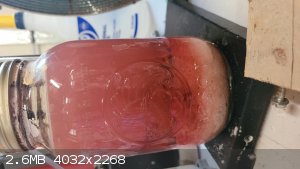
"You can't do that" - challenge accepted
|
|
|
DocX
Hazard to Others
  
Posts: 179
Registered: 22-10-2015
Member Is Offline
Mood: No Mood
|
|
An overly destructive decarboxylation
A pyridine quest. Niacin + copper carbonate + heat. Unfortunately I got impatient and cranked up the heat too much, so the distillation setup got
overflowed with sublimated niacin and pyridine vapours. And the yield was TERRIBLE as a result.
The crude, yellow distillate was mixed with a few grams of sodium hydroxide and redistilled. I fractioned out nice, clear pyridine and some cloudy
drops in a spider. The cloudy fraction was dried with magnesium sulphate overnight and cleared up fine. In the end I actually got around 140 ml of
nice, pure pyridine.
On a side note I really can't understand how people can compare this smell to rotten fish. That can only be done by people who never smelled either
rotten fish or pyridine.
I actually don't think the smell is that bad. It's not nice, and I have no urge to smell it again, but rotten fish? Really?
Doing my chemistry on the countryside and actually fishing between sessions, I happened to have some discarded fish parts rotting away closeby.
Nope. No likeness.
And as for the title, I'm not sure I'll ever get that RB clean again. I tried a base bath, sulphuric acid, oven cleaner, everything. it remains partly
charred.
Sigh.
We had a good run.
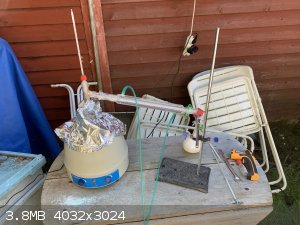 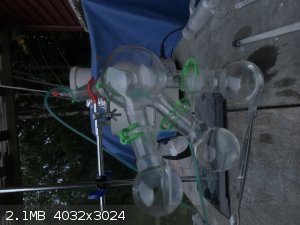
[Edited on 20222222/7/25 by DocX]
|
|
|
DocX
Hazard to Others
  
Posts: 179
Registered: 22-10-2015
Member Is Offline
Mood: No Mood
|
|
Some more pics: charred 3 neck RB and horribly, horribly overflowed receiving flask.
Also visible is my sloppy addition of the starting powder. Let it snow, let it snow, let it snow ...
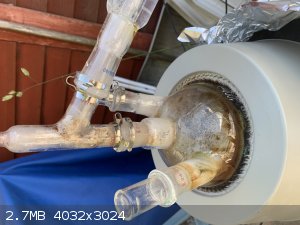 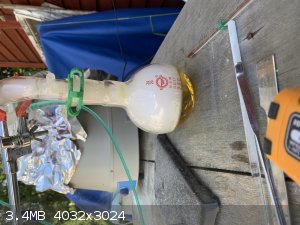
[Edited on 20222222/7/24 by DocX]
|
|
|
Organikum
resurrected
    
Posts: 2339
Registered: 12-10-2002
Location: Europe
Member Is Offline
Mood: frustrated
|
|
Quote: Originally posted by DocX  |
.....
And as for the title, I'm not sure I'll ever get that RB clean again. I tried a base bath, sulphuric acid, oven cleaner, everything. it remains partly
charred.
........
[Edited on 20222222/7/24 by DocX] |
The stains are from the copper? Hot oxalic acid will fix it then, no problem.
/ORG
|
|
|
DocX
Hazard to Others
  
Posts: 179
Registered: 22-10-2015
Member Is Offline
Mood: No Mood
|
|
I'll try that too, but I don't think it's copper per se. I've already tried some of my precious nitric acid without result. It's most probably just
carbonised residues. Burnt stuff. A lot of it was removed with oven cleaner, but there are spots in there that are just really really tough to get
out.
I also don't have any H2O2 of decent concentration, otherwise I would try piranha solution, naturally. I guess chromic acid is next. My sulphuric acid
is very dear to me though. My precious. Hate to waste it for cleaning purposes.
[Edited on 20222222/7/26 by DocX]
|
|
|
arkoma
Redneck Overlord
      
Posts: 1763
Registered: 3-2-2014
Location: On a Big Blue Marble hurtling through space
Member Is Offline
Mood: украї́нська
|
|
I've achieved 97% EtOH (started at 94%) so far via copper sulfate.
"We believe the knowledge and cultural heritage of mankind should be accessible to all people around the world, regardless of their wealth, social
status, nationality, citizenship, etc" z-lib
|
|
|
Lionel Spanner
Hazard to Others
  
Posts: 168
Registered: 14-12-2021
Location: near Barnsley, UK
Member Is Offline
|
|
Quote: Originally posted by DocX  | On a side note I really can't understand how people can compare this smell to rotten fish. That can only be done by people who never smelled either
rotten fish or pyridine.
I actually don't think the smell is that bad. It's not nice, and I have no urge to smell it again, but rotten fish? Really? |
Agreed. The best way I can describe it is like a cross between petrol and solvent glue.
|
|
|
DraconicAcid
International Hazard
    
Posts: 4360
Registered: 1-2-2013
Location: The tiniest college campus ever....
Member Is Offline
Mood: Semi-victorious.
|
|
Quote: Originally posted by DocX  |
On a side note I really can't understand how people can compare this smell to rotten fish. That can only be done by people who never smelled either
rotten fish or pyridine.
I actually don't think the smell is that bad. It's not nice, and I have no urge to smell it again, but rotten fish? Really? |
You don't think pyridine is that bad? Really?
Do you even have a sense of smell?
Please remember: "Filtrate" is not a verb.
Write up your lab reports the way your instructor wants them, not the way your ex-instructor wants them.
|
|
|
DocX
Hazard to Others
  
Posts: 179
Registered: 22-10-2015
Member Is Offline
Mood: No Mood
|
|
Haha, well, it's always a question of perspective, innit?
I just refluxed thiourea and DMF, and I'll take pyridine smell anytime over that stench.
But I didn't write that it smelled good, just not as bad as I had imagined from what I've read beforehand. And definitely NOTHING like rotting fish.
|
|
|
Rainwater
National Hazard
   
Posts: 946
Registered: 22-12-2021
Member Is Offline
Mood: Break'n glass & kick'n a's
|
|
Attempting a molten chloride cell, Gotten a few pops but so far it's been a disappointment.
"You can't do that" - challenge accepted
|
|
|
DraconicAcid
International Hazard
    
Posts: 4360
Registered: 1-2-2013
Location: The tiniest college campus ever....
Member Is Offline
Mood: Semi-victorious.
|
|
Did a very quick-and-dirty version of the benzoin condensation, and it seems to have worked nicely.
Please remember: "Filtrate" is not a verb.
Write up your lab reports the way your instructor wants them, not the way your ex-instructor wants them.
|
|
|
arkoma
Redneck Overlord
      
Posts: 1763
Registered: 3-2-2014
Location: On a Big Blue Marble hurtling through space
Member Is Offline
Mood: украї́нська
|
|
Ethanol, so much ethanol.
"We believe the knowledge and cultural heritage of mankind should be accessible to all people around the world, regardless of their wealth, social
status, nationality, citizenship, etc" z-lib
|
|
|
DraconicAcid
International Hazard
    
Posts: 4360
Registered: 1-2-2013
Location: The tiniest college campus ever....
Member Is Offline
Mood: Semi-victorious.
|
|
I tried the condensation reaction of anisaldehyde with malonic acid, hoping for p-methoxycinnamic acid. I tried two slightly different methods and
got two very different products- one is fluffy white crystals, the other is a sulphur-yellow powder.
I strongly suspect the yellow one would be anisylidenemalonic acid.(CH3OC6H4CH=C(CO2H)2)
Please remember: "Filtrate" is not a verb.
Write up your lab reports the way your instructor wants them, not the way your ex-instructor wants them.
|
|
|
| Pages:
1
..
10
11
12
13
14
15 |